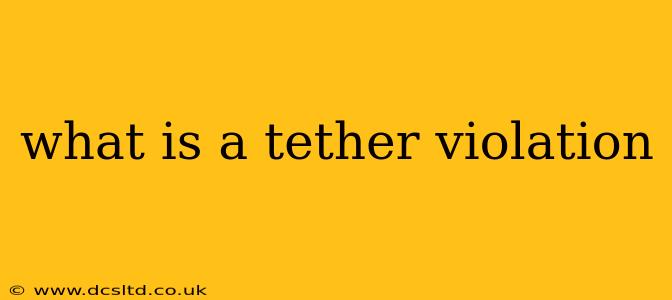A tether violation occurs when someone subject to electronic monitoring, often as a condition of probation, parole, or pretrial release, breaches the terms and conditions of their monitoring agreement. This can have serious legal consequences, potentially leading to revocation of the release and return to custody. Let's delve deeper into this critical topic.
What is Electronic Monitoring (Tethering)?
Before examining violations, it's crucial to understand electronic monitoring itself. Tethering, or electronic monitoring, uses technology like GPS trackers, ankle bracelets, or other devices to track an individual's location and movements. This technology is used as a form of supervision, often for individuals deemed low-risk but who still require oversight. The conditions of their monitoring are set by the court or parole/probation officer and can vary significantly depending on the individual's circumstances and the nature of their offense.
Common Types of Tether Violations
Tether violations can range in severity. Some examples include:
- Leaving a designated area: Exceeding pre-approved boundaries, whether geographical zones or specific locations, is a common violation. This could involve going to a place specifically forbidden by the court order, like a bar or school.
- Tampering with the device: Attempting to remove, disable, or damage the electronic monitoring device is a serious violation, often resulting in immediate legal action.
- Failing to charge the device: Consistent failure to keep the device charged and functioning properly can also be considered a violation, demonstrating a lack of compliance with monitoring conditions.
- Curfew violations: Failing to be at a designated location within specified timeframes is a clear violation of the monitoring agreement.
- Alcohol or drug use: Depending on the terms of the monitoring, the detection of alcohol or drug use through testing can be a significant violation, even if it's off-site.
- Contact with prohibited individuals: This can encompass communication with victims, co-defendants, or anyone specifically forbidden by the court.
What Happens After a Tether Violation?
The consequences of a tether violation depend on several factors, including the severity of the violation, the individual's prior record, and the specific terms of their supervision agreement. These can range from:
- A warning: For minor, first-time infractions, a verbal or written warning might be issued.
- Increased supervision: More frequent check-ins or stricter monitoring conditions may be imposed.
- Revocation of probation or parole: Serious or repeated violations can lead to the revocation of probation or parole, resulting in imprisonment.
- Modification of release conditions: The court may modify the terms of the release, possibly imposing more restrictive measures.
- Criminal charges: In some cases, particularly with tampering or other willful acts of non-compliance, new criminal charges can be filed.
How Can I Avoid a Tether Violation?
Avoiding tether violations requires careful adherence to the terms and conditions of your monitoring agreement. This includes:
- Thoroughly understanding the conditions: Ensure you have a clear understanding of all the rules and restrictions imposed.
- Keeping the device charged and functional: Maintain the device properly to ensure it's always operating.
- Staying within designated areas: Avoid venturing outside permitted zones.
- Abiding by curfew: Adhere strictly to all curfew requirements.
- Avoiding prohibited substances and contact: Refrain from any behavior that violates the terms of your supervision.
- Regular communication with your monitoring officer: Maintain open communication with your probation or parole officer to address any questions or concerns.
What if I accidentally violate my tether?
Accidents happen, but it's crucial to immediately report any unintentional violations to your monitoring officer. Acting swiftly and honestly can often mitigate the consequences. Delaying reporting or attempting to conceal a violation will only worsen the situation.
This information is for educational purposes only and does not constitute legal advice. If you have questions about a tether violation, it's essential to consult with a qualified legal professional.
